A Chat with Isabella Rossellini
Let us not mince words: Isabella Rossellini is one of the most beautiful actresses in the business. This should come as no surprise to anyone who knows of her gene pool (she’s Ingrid Bergman’s daughter), but given that she seems to pop up all too infrequently in films and on television, perhaps a few more directors and directors need to be reminded. Fortunately for you and I, Rossellini can be found amongst the cast of the “The Phantom,” SyFy’s attempt to reinvigorate the franchise of the character often referred to as “The Ghost Who Walks,” which premieres on June 20th. This appearance was particularly fortunate for me, as it presented me with the opportunity to chat with Rossellini about her work not only in this production but also in “Blue Velvet,” “Friends,” “Alias,” “30 Rock,” and her infamous Sundance Channel short-film series, “Green Porno.”
Prepare for your heart to go pitter-pat as you read…
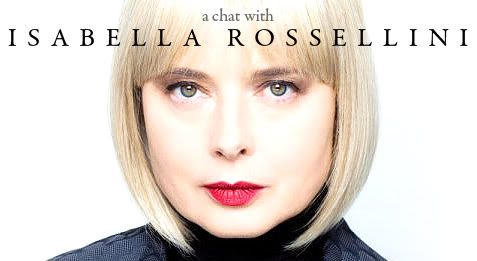
Isabella Rossellini: Hi!
Bullz-Eye: Hello! How are you?
IR: I’m fine, thanks. And you?
BE: I’m wonderful. It’s a pleasure to speak with you.
IR: It’s nice to talk to you. Thank you for interviewing me!
BE: (Laughs) Not a problem! Well, “The Phantom” is certainly not your first foray into the world of science fiction, but are you actually a fan of the genre?
IR: I’m not really a fan of the genre. You know, I do see some films, but I must say I don’t go see them religiously. I love working with the producer, Robert Halmi, with whom I’ve done several films, so when Halmi called me to play this small role in “The Phantom,” I had no hesitation. I’ve been with him for five or six productions in the last 25 years, among which are “Merlin,” “The Odyssey,” and “Don Quixote,” and they’ve always been wonderful. They’ve always been… (Hesitates) It’s been great to work with the group, he has a fantastic eye, and every time he hires a director, it’s always somebody young who…well, he just has an eye. He hires them, and they turn out to be fantastic and, a few years later, they’re top directors. That’s how it has been with Paulo (Barzman), the director of “The Phantom.” So the reason why I said “yes” to this small part was because of this history that I had with Bob Halmi, and…I was surprised, actually. I had a doubt. For me, the Phantom was so much that image that I had from the 1930s, and he kept on saying, “No, no, it has nothing to do with that. It’s not trying to be retro.” And that image of the original comic strip was so strong that I was amazed, actually, when I arrived and had seen how they had transformed it to be a contemporary, modern film.
BE: So what are the challenges of playing a part like this? Because I’d think it would be a challenge to play a live-action comic book character without taking it over the top.
IR: Well, actually, you know, to tell you the truth, there were no challenges. At the beginning, you search a little bit for the look, especially when you play a small part. Every beat counts, you know. Sometimes when you have the lead, if you think it, you maybe play a part too seriously. You think, “Maybe I should smile,” and you have other possibilities later in the film to add a smile or to add some softness to your character, for shading. But when you play a small role, in a way, you have to hit every note correctly, so I think that the way she looked also was very important. When I was told that they wanted me to be a blonde…because they told me on the phone: I live in New York, but the film was shot in Montreal…I said, “Oh, blonde, it wouldn’t work with me. I’ve tried it several times, but I can’t go with it. My hair is brown. I can become easily black-haired. I can even become red-haired. But blonde has never worked with me.” But when I arrived, inevitably, there were all these blonde wigs, so I said, “Okay, I’ll show you what I mean.” And, instead, it worked perfectly, because the character should be totally artificial. I had these metallic clothes that always tended to be on the silver side, so, actually, the look of this evil person was helped a lot…it helped me to imagine the character. But the challenge is not the words. It’s so much fun that I’m always amazed that I even get paid for it. (Laughs)
BE: As far as the blonde look, I felt like it actually added to the iciness of the character…
IR: Exactly! When I saw it in with the silver clothes and with the lips and the heavy make-up…she is a person who has no feeling. (Starts to laugh) She loves technology, she loves what she can do, but she has absolutely no feeling. And no morals. She is totally amoral.
BE: …and I was actually preparing to ask you if playing the villain is as much fun as it seems to be, but you just addressed that.
IR: Oh, it is! It really is. I don’t know why it is so much. Maybe it’s because, in our lives, we’re always considering ourselves to be good. The majority of us make an effort to be good and nice, so that when you’re given free reign to be evil, it feels so liberating! (Laughs)
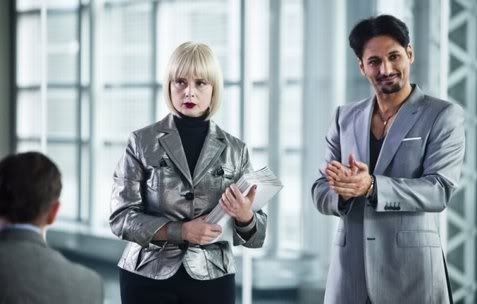
BE: Your character also gets to play off another villain, played by Cas Anvar. Did you guys have fun trying to match each others’ evilness?
IR: (Laughs) Yes! It was fun to work, but I have to say that I was on the set very briefly. I was on the set…I think hardly a week. I think it was less than a week. So my evilness casts a shadow in the film, and you certainly remember the horrible lady, but unfortunately I think I only shot three or four days. Bella was memorable because she was so nasty… (Laughs) …but we shot it very fast, my role, so I didn’t really have much time to have many scenes or to get to know everybody well.
BE: To jump back to discussing Robert Halmi for a moment, I’m sure I’ve talked to two dozen people who’ve worked for him over the years, and every one of them has spoken of what a wonderful guy he is.
IR: Yeah, you know, he is. Generally, I choose my roles based on who’s directing. I never really…you know, you look at the producer to make sure he’s serious, that he has the distribution, that he knows how to manage financially a film, but I never really look at the producer. I always look at the name of the director. And with Bob Halmi, I don’t even look at the director…sometimes I don’t even know their work!…because he has this incredible eye where he can always cast a new director who’s done a small film somewhere in the world. Also, the other thing with Halmi is that he’s Hungarian, so he speaks Russian, he speaks English, he speaks Italian…he speaks every language! He travels extensively all over the world. I’ve worked with him with directors from England, from Russia…we worked with Andrei Konchalovsky, who then became such an established director…because he can see talent. He really is not only a fantastic producer but a real talent scout.
BE: I’ve never heard anyone say a bad word about him. But I have heard people do some really bad impressions of him.
IR: (Bursts out laughing) Yes, because of his accent…and because he has no patience!
BE: I can’t remember who it was, but I spoke to someone not long ago who was talking about how he’d pitched a project to Halmi, and his response was, “Goddammit, we’ll do it!”
(Writer’s note: It was Patrick Stewart.)
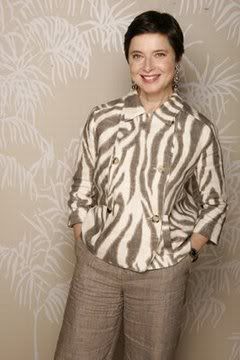
IR: (Laughs) He’s a do-er, definitely! You know, I met him in a very funny circumstance. When my mother died, my mother had just published…well, ten years earlier…her autobiography, and when she died, her agent wanted to make it into a film. And in the way she was saying it, she was trying to convince us children…we didn’t really want to have Mama in a film on television, but she said, “No, you’d better do it yourself, because if you do it yourself, then you have control of it.” She said, “If you don’t do anything, then the film can still be based on press articles and interviews with other people, and they can still make a biography of her, and then you have no control, and that’s when it really is a problem.” So it was my mom’s agent, Kay Brown…imagine, of all people! She was working under (David O.) Selznick, and she was the one who brought Selznick the script of “Gone with the Wind,” so you talk about a long history with the cinema! But it was Kay Brown who suggested that the four of us…Ingrid Bergman’s children…meet with Robert Halmi, and I went with the most hostile attitude, because I felt like I did not want to have a film made about my mom, and yet I was given no choice, because otherwise they were going to make a bad film about her, no doubt. So I went with such anger, and he charmed me instantly. And since then, we ended up not making the film about Mama, but I’ve made lots of films with him, and we are good friends. He’s been one of the most wonderful friends, but he’s also been one of the best work collaborators that I’ve had.
BE: Well, having brought up your mother, I wanted to ask you about how you first came to acting. I know you’d kind of dipped your toe into the waters when you appeared with her in “A Matter of Time,” but what made you decide to shift from a pretty successful modeling career into the family profession, as it were?
IR: Well, you know, what happened was that modeling…I knew that it was not going to last. I did not want to act, because I thought that I could never be as good as my mom, and so I was always going to be a frustrated person in my life because everyone would say, “Oh, she’s not as good as her mom,” and it was going to be very difficult to match my mom’s career. So I thought that I wasn’t going to be an actress. When I became a model, and then I became quite successful as a model, I still loved films very much, so I thought, “Well, let me try and be an actress,” because then I had the certitude that I could do it, that I could make it. I did know how to have a career, and I’d had a big career as a model, so I thought, “Well, let me try, and if it works, it doesn’t work, it wouldn’t be as big a mistake as it would’ve been when I was 18,” because I knew that I’d been successful in my career, and now I was trying to evolve. As a model, you have to evolve into something else. You know that it’s one of those careers, like a sports person or a dancer, where you stop when you’re 30 or 35. But it was the success of modeling that gave me the courage to attempt acting, and model and acting are very related. There is no dialogue or there is no story that you tell, but you have to emote in front of the camera, you have to express emotions. So the success of being a model gave me the confidence to think that maybe I could learn lines and place them into a story… (Laughs) …and could just do it! And my acting career has been only rewarding. I’ve loved it!
BE: As it happens, I caught a bit of “White Nights” on cable last night.
IR: Oh, you did? How nice! That was one of my first films! It was the first film that I said, “I’ll be an actress.” With “A Matter of Time,” I did that because my mom was in Rome filming that film, and she thought that it would be fun to have her children one day on the set with her, so she got us a job on the set, so one of us could be with her all day and see what was happening.
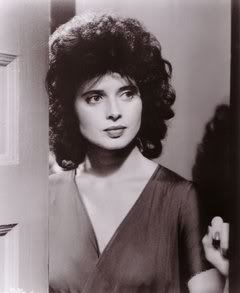
BE: With “Blue Velvet,” what was it like to work with Dennis Hopper? I mean, he was a pretty big name, and for all practical purposes, you were still a pretty new actress at that point.
IR: Yes, because that was only my second film! (Laughs) You know, Dennis Hopper was wonderful. When he did “Blue Velvet,” he had just come out of rehab, and as David Lynch said, “It’s like sitting next to a ticking bomb.” (Laughs) We never knew if he was going to remain sober or not! But he had gone through Hell and came back out the other side, and he had that wisdom and compassion. He was non-judgmental of other people, he was open, he had heard it all. You could really tell Dennis anything, and he would laugh or make you feel good about it. There are very few people who come out of what he had come out of, his journey, but when they do, as Dennis did, they are really tremendous people, and Dennis, for sure, was one of them.
BE: Your performance in the film as Dorothy…I’ve always wondered how David got such a gut-wrenching performance out of you, and if the role left any residual effects.
IR: (Laughs) Well, David is a very good director, and it was very well written, the script, so all of that obviously…sometimes you can be as good as your role is written, then you can enhance it, but the role was fantastic, so I definitely owe it to David’s talent. No, it didn’t have a lasting effect on me, but it makes me a little bit nostalgic. It still does. Recently…I forget where I was, but they were showing clips of me and my films during an interview, and there was obviously one of “Blue Velvet.” I don’t know why it hit me that time, but I was hit with just an incredible heartache, and I became so nostalgic of that film and of the group of people that I worked with. It was even before Dennis died, so I think now it would be even more devastating to show a clip of “Blue Velvet,” now that Dennis is dead. I was really lucky. When we were doing the film, we realized it. I thought that I was doing a special film, but certainly I didn’t know that the film was going to get so much attention and so much success. But it did feel special when we were doing it. It was wonderful. It was a wonderful set.
BE: I have to admit something to you: as soon as I saw your name amongst the cast of “The Phantom,” my first thought was actually not of “Blue Velvet,” but of your episode of “Friends.”
IR: (Laughs) That is incredible, you know? One day, one scene! Once, I was…I live in the country, and my neighbor said, “Isabella, can you do me a favor? I will win this game if I can bring the most famous star to this radio show. Can you answer for me?” And I said, “Of course,” because it was a mere phone call. And then the next day, the radio calls me, and they had to make sure that it was really me, that it wasn’t just somebody putting on an accent…so they said the line from “Friends” about the list, and they said, “What is this?” And I didn’t remember! (Laughs) But then I finally got it, and I remembered that it was the line from “Friends.” But I was so stunned that the television show was so popular that, to identify yourself, you’d have to repeat the line. More than my name or my accent, it was, if I knew the line, then I was for sure Isabella Rossellini. (Laughs)
BE: I also think about the way David Letterman has stretched out the pronunciation of your name.
IR: Oh, you know, it’s a nightmare, because every time David Letterman says, “Eeeeeeeesabellllllla Rrrrrrrossalliiiiiiiini,” for the next three or four days, as I walk down the street, I hear people say, “Eeeeeeeesabellllllla Roooooooossalliiiiiiiini!” (Laughs) And they fill me with embarrassment!
We interrupt this interview for an MP3…
Okay, I never do this, but I feel obliged to include an MP3 of this particular exchange, because the written word just doesn’t do it justice, so here you go:
Eeeeeeesabellllllla Rrrrrrrosselliiiiiiini
…and, now, back to your regularly scheduled interview!
BE: I’m actually a member of the Television Critics Association, so I was there when you were doing your panel for “Green Porno” for the Sundance Channel, and I just think those are a stitch.
IR: (Laughs) What does this mean, “a stitch”?
BE: (Laughs) It means that I think they’re hysterical. And educational, too!
IR: Well, they’re meant to be funny… (Laughs) …but then I wanted people to say, “Oh, I didn’t know that,” so I wanted that reaction.
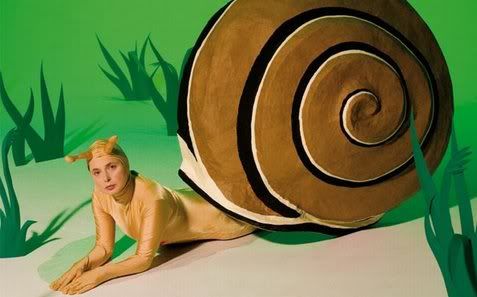
BE: So how did the idea for the films come about?
IR: Well, I was always interested in animals since I was a little girl, and Robert Redford was of the idea that the internet can be a new outlet for short format films, because short format films had fallen out of grace. Now, the shortest form that you can do professionally is the half-hour of television. Any short film is done by a student at university to showcase their talent, but they don’t have an outlet. They have festivals, but not a professional outlet where they earn money. But Redford thought that the internet might be a possibility, so he reached out to some of the community, including me, because, you know, I’ve done so many independent films. (Laughs) Every other year, I’m there at the festival! And he had caught the first film that I had written, called “My Dad Is 100 Years Old,” and he really liked that film, so he proposed that I would do a series, and he said, “You know, if the series can be about the environment, I would pay more attention to it, because I want Sundance to be very involved with the environment.” And at the time, Sundance was doing…and is still doing today…a series called “The Green,” and that gave me the idea to call it “Green Porno,” because I was more interested in animals, but I said, “Nobody’s interested in animals, but if I make it about the sex life of animals…” (Starts to laugh) “…it’ll be interesting to me, it’ll be interesting to a big audience, and Bob will be happy because it’s green!”
BE: I wanted to ask you about a couple of your other television appearances. You were a recurring character on “Alias” as Sydney Bristow’s aunt. How did that come about?
IR: Oh, the character on “Alias” was…actually, it was the great J.J. Abrams who asked for me, and I was incredibly honored. When…oh, what is the name of the fantastic Swedish accent who played the mother? Lena Olin! For whatever reason, Lena Olin couldn’t do the whole series, because the series lasted for many, many years. Then J.J. said, maybe because I’m half-Swedish, “Could you play the sister, so we can still have this evil family?” (Laughs) So I did! I came in and played a few episodes for that season when Lena couldn’t do it, and it worked perfectly well, because Lena and I could be sisters. I think we have a similar accent, and we’re physically similar. We’re often up for the same parts! So it was great.
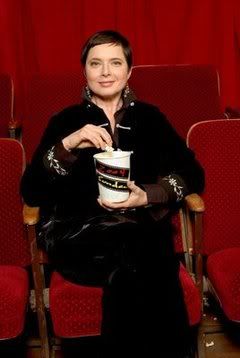
BE: I have just two more quick ones to close. First, do you think we’ll ever see you return to “30 Rock”?
IR: You know, everybody asks me this, and I am asking myself the same question every time. When we did the show, I got so many compliments, but also from Tina Fey and Alec Baldwin, and they said, “Oh, you’ve got to come back! This is too good, with you as the character of the ex-wife!” So I was convinced that I would have, nearly every year, been able to play a couple of episodes with this fantastic relationship and this unresolved love that translated to great hostility and hatred. So I am actually surprised that I haven’t been asked back…but I haven’t!
BE: I’ll keep my fingers crossed that it may yet happen.
IR: They certainly have the gift of making you feel that you’re the most important person on Earth with the way they compliment you! (Laughs)
BE: And, lastly, you were in the film “The Saddest Music in the World,” so I was just wondering what, for you, is the saddest music in the world.
IR: (Laughs) Oh, I haven’t thought about that! I was about to say “Happy Birthday,” because for a lot of people it is, but I have to say that I don’t mind growing old. My birthday is soon, so I’m organizing a big party for myself! (Laughs) But I could understand if “Happy Birthday” is sometimes the saddest music in the world, especially as the years grow bigger. I do love working with Guy Maddin, with whom I’ve done several films. I’m about to leave in two weeks to make his new film, “Keyhole.”
BE: Oh, excellent. Yes, I knew you’d narrated his film “Brand Upon the Brain.”
IR: Yes, and he was also the director of “My Dad Is 100 Years Old,” which I wrote and starred in. We’re very good friends, so I wanted to do “Keyhole” with him.
BE: Well, since I won’t talk to you on Friday, let me wish you a happy birthday now…
IR: (Laughs) Thank you very much!
BE: …and say thank you for speaking with me.
IR: Thank you for interviewing me!
Related Posts
You can follow us on Twitter and Facebook for content updates. Also, sign up for our email list for weekly updates and check us out on Google+ as well.
Posted in: Entertainment, Interviews, Movies, Television
Tags: 30 Rock, A Matter of Time, Alec Baldwin, Alias, Andrei Konchalovsky, Blue Velvet, Brand Upon the Brain, Cas Anvar, David Letterman, David Lynch, David O. Selznick, Dennis Hopper, Don Quixote, Friends, Green Porno, Guy Maddin, Headlines, Ingrid Bergman, Isabella Rossellini, J.J. Abrams, Kay Brown, Keyhole, Lena Olin, Merlin, My Dad Is 100 Years Old, Patrick Stewart, Paulo Barzman, Robert Halmi, Robert Redford, Sundance Channel, The Green, The Odyssey, The Phantom, The Saddest Music in the World, Tina Fey, White Nights, Will Harris










